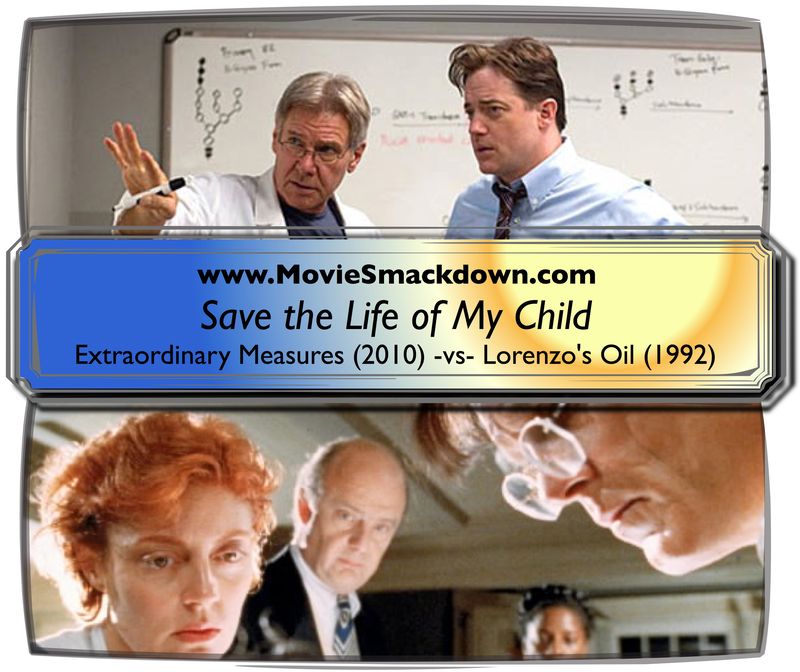
 The Smackdown
The Smackdown
Ask any parent. Life pretty much stops when your kid gets sick, even if it’s just the flu. You do everything to tend to them and make them better. And they do get better and life goes on. Now imagine your child is sick with a disease that will soon kill them, and the medical establishment seems to be telling you to be patient while they do their research, and you know that while that happens, your son or daughter will die. Here we have two films, both inspired by true stories, where the parents take matters into their own hands.
The challenge, of course, is to make films like these compelling enough to attract an audience, when such subject matter hits so close to home. Â The children in these stories did nothing to deserve their fate, nor did the parents, and so we are reminded of our vulnerability to the luck of the draw. Then again, when this kind of movie works, it can be uplifting and empowering on a very personal level. Â But do these two films achieve that goal without venturing into the cheap sentimentality of TV-Movie territory?
[singlepic id=741 w=320 h=240 float=right]
The Challenger
In Extraordinary Measures, up-and-coming marketing exec John Crowley (Brendan Fraser) quits his job, turning his life upside down, in order to chase a cure for a rare, fatal genetic disorder that two of his three children suffer from. This involves finding Dr. Robert Stonehill (Harrison Ford) in the middle of Nebraska and convincing him to drop everything and start a company that will focus on producing a drug to control the disease, known as Pompe.
Director Tom Vaughan exercises great restraint with the actors, both young and old. He’s obviously aware of his story’s power and seems loath to manipulate viewers with heavy melodrama. That instinct is admirable, if not always successful. While the film is emotionally affecting at times, Vaughan and screenwriter Robert Nelson Jacobs give much screen time to the father’s quest to raise funds and navigate an oppressive and dysfunctional health care system, and not so much to the sick kids who give the movie its heart.
[singlepic id=743 w=320 h=240 float=right]
The Defending Champion
Co-written and directed by a real doctor, George Miller, Lorenzo’s Oil is the story of Augusto and Michaela Odone (Nick Nolte, Oscar nominee Susan Sarandon) who have a son who’s been diagnosed with ALD, a rare nerve disease that only strikes young boys, and it’s always fatal. Both of them throw everything they have into understanding the science behind it and actually discover a treatment. Getting there involves good old-fashioned research and brain-power and leads, incredibly, to a secret ingredient: olive oil.
This movie moves at an exquisitely slow pace, which makes it hard to sit through at times — not because it’s boring, but because we feel the parents’ maddening anxiety so intensely. At two-plus hours, it’s a drain, but ultimately very much worth the emotional investment.
The Scorecard
Both movies are all about overcoming the odds, and a parent’s love that allows them to suffer anything to help their children. In Extraordinary Measures, this involves the Internet, but Lorenzo’s Oil takes place in the world before all the answers were at your fingertips, and initially, it seems like a tougher problem. God knows it’s hard for an average guy to find venture capital and start a company, but it’s not quite the level of problem as actually becoming a scientist and curing a disease. So, in set-up, Lorenzo’s Oil has more obstacles, but it’s also way more daring in depicting the desperate parents.
There’s a grave risk of sentimentality in these set-ups, which is why TV films were drawn to this subject matter back in the day. One way to skirt it is to show the warts on the people affected by the tragedy. Although there are characters in Extraordinary Measures who aren’t saints (notably, the prickly scientist played by Ford), the parents sure are. Lorenzo’s Oil, in contrast, is courageous enough to suggest that in this war to save a child, both parents become sort of, well, unlikeable, because the stakes are too high to care about being nice. It’s a bold choice.
Both films try to strike a balance in not stereotyping the medical establishment as unfeeling money-grubbers and to see them as scientists who are trying to solve a problem by being unbiased in their approach, something that desperate parents can never really be. Extraordinary Measures also tries to be a critique of the corporate establishment, but honestly, the arguments made by the establishment figures in this film seem pretty sane when you consider them.
Although, as noted, both films are more or less based on true stories, Lorenzo’s Oil is a little more and Extraordinary Measures is a little less.
The Decision
I have a lot of reasons to like Extraordinary Measures, and I might as well disclose them. It’s made by CBS Films, where two key players in the company’s executive ranks are personal friends. It’s their company’s first film out of the gate, and it would be great if they nailed it (especially since they invited me to an incredibly excellent premiere party). Also, Brendan Fraser was nice enough to be a part of my wife’s charity project, The Hollywood Cookbook, and is a real stand-up guy. Okay then, there’s that. But the truth is, if you only have the heart to take in one parental struggle story, it’s Lorenzo’s Oil, a powerful and edgy telling. I’m not saying that Extraordinary Measures won’t appeal to Fraser and Ford fans, or that there aren’t families out there that would like to see a film with a positive message (e.g. The Blind Side) but as directed by Vaughan, this one is soft when it needs to be hard. It probably earns the slam it’s going to get in most reviews, that it feels like a perfectly nice TV movie where they managed to snag an above-average cast. I wish it was more and I bet my friends do, too. I hear their next film is going to kick ass…





With all those show biz connections, Bryce, perhaps you should have recused yourself on this one. But you managed to stay objective somehow. Kudos. And if your friends are looking for new friends to take your place, I’m available.
I have considerable trouble criticizing this genre; it’s probably magical thinking on my part, but I find myself hesitant to come down hard on any of the sick-child-movies or medical dramas lest some resulting bad karma pay an unwelcome visit to my family and loved ones. Frankly, I know I’d make a terrible scientist and an even worse fundraiser; my hat’s off to all involved in the films and in the real life stories.